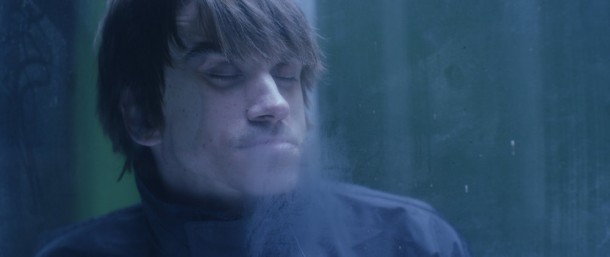
Dir.: Emma Razinski; Cast: Adnan Omerovic, Susanna Capellaro, Tina Keserovic; UK/Bosnia and Herzegovina 2016, 82 min.
Australian born Filmmaker and writer Emma Razinski is the first MA student to come out of Bela Tarr’s film factory in Sarajevo. The impressive upshot of the master’s extensive mentoring is a study of apathy, in which the real Sarajevo building of the title actually has a character role.
Damir (Omerovic) is the security guard in Papagajka, spending his days in the glass cage, observing more or less nothing. In the evening he takes the lift up to his flat where he meets another (silent) inhabitant of he building for a rooftop smoke. Damir plays ‘Noughts and Crosses’ in his cage, using the dirty glass walls as a blackboard. The only contact to the outside world is his sister Kamala (Keserovic), who encourages him (in vain) to meet family and friends. Then one day, an enigmatic woman, calling herself Tasva (even though we learn later that he real name is Benedetta), appears at his door, claiming that she has been robbed and needs a place to sleep. Damir, pathologically shy, gives in, against his instinct. Soon the stranger takes over his place: changing the lock to the front door, redecorating the flat, throwing his stuff out, and finally taking over his bedroom, relegating him to the makeshift bed he had made for her in the kitchen. Their contact is minimal: they play cards, eat and drink. Only once do we see them in an – awkward – embrace. When Damir falls ill, he suspects that the mysterious lodger is to blame.
Long, stationary shots dominate Papagajka, the building provides a claustrophobic microcosm of contemporary Hungary, even the roof scenes induce paranoia. Damir communicates by way of numbers and figures: besides the ‘Noughts and Crosses’ he plays Sudoku. He is a man who has slipped through the cracks of time, writing him name on the dusty windowpane, to remind himself of his banal existence. A low level obsessive-compulsive, he channels his angst into dream sequences, while enduring everyday life and Tasvas’s presence in a silent scream.
Rozanski financed the film partly through crowd-funding but is as uncompromising as her mentor: she insists on telling the – not very elaborate – narrative in images, reducing her protagonists to the occasional sentences, letting their actions talk on their behalf. There a penumbral and eerie charm to the Papagajka building – it could very well be a submarine on the bottom of the sea. DoP Malte Rosenfeld (graduate of the Lodz Film School) uses sparse lighting to enhance the woozy atmosphere. Papagajka might not be for everyone, Rozanski style is an unique and talented new voice.
EAST END FILM FESTIVAL | 17 JUNE 2017 | EVERY WEEKEND UNTIL JULY 2017 AS